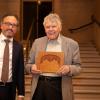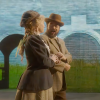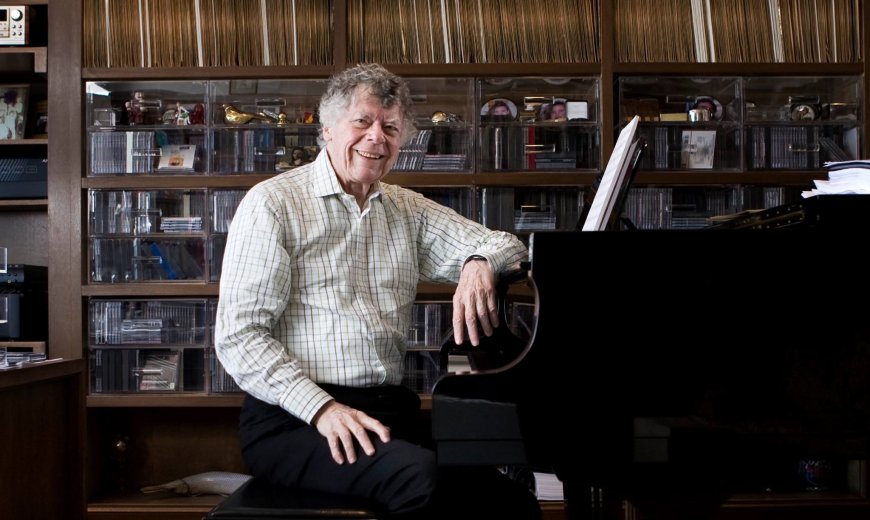
San Francisco-based composer Gordon Getty’s fourth opera, Goodbye, Mr. Chips, has not followed the traditional path from conception to the stage to audio recording.
The planned premiere at Festival Napa Valley in July 2020 was confounded by COVID. On the suggestion of director Brian Staufenbiel, the production was shifted from the live stage to the medium of film, requiring a bigger budget and many months of enterprising adaptation and innovation. The premiere screened at the Smith Rafael Film Center in San Rafael in November 2021 and has since been seen in select theaters coast-to-coast.
In the time leading up to the release of an audio recording of the opera, now available on the Pentatone label, subtle changes were made to the score. In an interview with SF Classical Voice, Getty commented that he’d found some vocal lines in the film “taxing for the singers, with the tessitura unnecessarily high,” so he made alterations for the album. (Editor’s note: Getty is a funder of SFCV.)
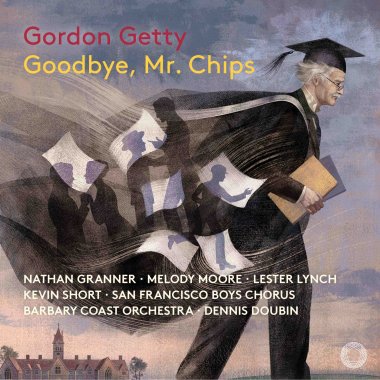
Those changes were welcomed by tenor Nathan Granner, returning to the titular role of Chips that he sang in the film. “Not only did it change the tessitura, but it changed Chips’s character a bit,” he said. “It grounded Chips, and it gave him more of a stately appeal. And Gordon rescored and reorchestrated a large part of the opera.” Goodbye, Mr. Chips is a somewhat revised take on James Hilton’s 1934 novella of the same name, about a beloved English boarding school teacher.
“Mr. Getty added back some of the original score, which had been edited out for the film,” noted Grammy Award-winning engineer and producer Leslie Ann Jones, director of music recording and scoring at Skywalker Sound in Marin County, where the album was recorded in February of last year. “He wanted this project to represent everything he’d written for it, which is much easier to do with digital recordings these days, whereas with a film it’s as much about pacing and storytelling as anything else.”
The expertise of the audio production team and the state-of-the-art resources of Skywalker Sound will be as gratifying to listeners of this album as they were to the musical talent on the project. “Leslie really wanted to capture a transparency that we weren’t able to gather at the San Francisco Conservatory of Music’s Studio G,” said Granner, referencing where the film soundtrack was recorded. “At Skywalker, we [the singers] were in isolation booths. Leslie could come to the booth and say, ‘Are you all right?’ because you’re literally singing into her ears. She’s a stickler for tuning and for tempi. I think what Gordon and Leslie and all of us were trying to do is just to give that much more emotion to this piece. Gordon is very effective in emotional scoring.”
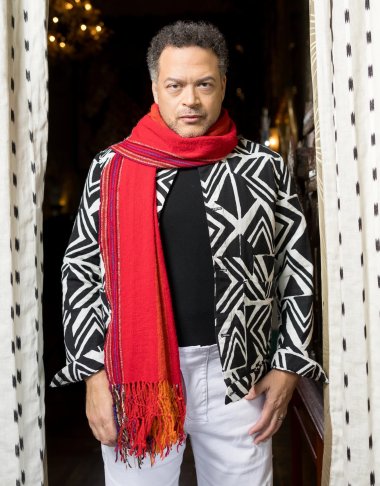
Those who appreciated the film will inevitably find themselves seeking commensurate emotional reward from the album. And they’ll find it. Granner’s empathetic embrace of the resilience of Chips is showcased, as is his skill in navigating the character’s six decades of aging and interactions with the students and other principal cast.
Soprano Melody Moore, previously featured in the 2012 recording of Getty’s opera Plump Jack, sings the role of Kathie, Chips’s beloved, short-lived wife. Her take of the character is full-throated and appealing. As Merrivale, baritone Lester Lynch (whose recital album with pianist Kevin Korth was released on Pentatone last fall) sustains the narrative and companionship with Chips in a luminous, engaging voice. Bass-baritone Kevin Short, in dual roles, artfully conveys both the brooding antagonism of headmaster Ralston and the benign support of Rivers, head of the school’s board of governors. The other singers aptly people the dynamics of challenge, loss, wisdom, and resolution over the two hours and 32 minutes of listening.
The San Francisco Boys Chorus, under the direction of Ian Robertson, represents the students of Brookfield School, where Chips spends his working life as teacher and interim headmaster. What’s dubbed the Barbary Coast Orchestra (a pickup team of musicians from the San Francisco Symphony and San Francisco Opera Orchestra) is conducted by Dennis Doubin.
While back at Skywalker for another Getty project, a new recording of Plump Jack, Granner spoke about his prerelease experience of listening to the 7.1 surround-sound recording of Chips. “Leslie took us back to the control room and said, ‘I want to play you the bombing scene,’” he recounted. “Well, Skywalker is the recording division of fricking Lucasfilm, and they have sound effects. This is the scene where Chips is reading about the Gallic Wars to the students and they’re undergoing an air raid. And it’s just shaking the control room. Besides that, you have the close miking of all these beautiful instruments.”
Aside from the historical record secured for Chips by this release, the album is a testament to how well the music and lyrics, both by Getty, and the performance and production can hold the attention of audiences anywhere. “It’s really kind of like reading a book,” said Jones. “You really can’t put it down. You want to find out what happens next.”
“When I hear music like this,” added Granner, “I want to turn on the lanterns, put on a warm fire, and enjoy the realness of life.”


